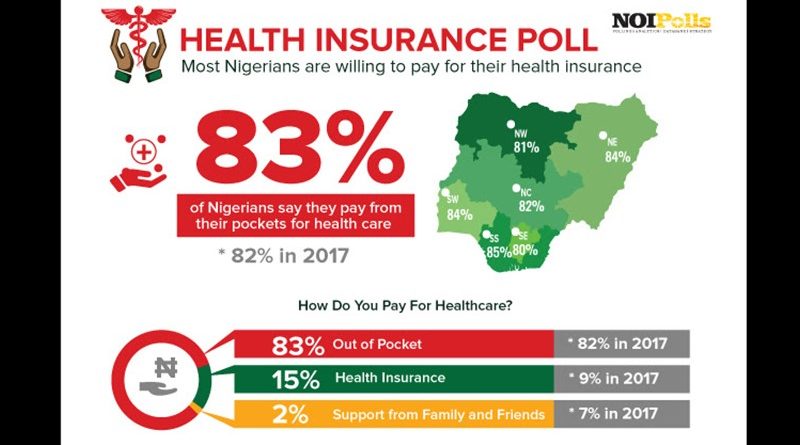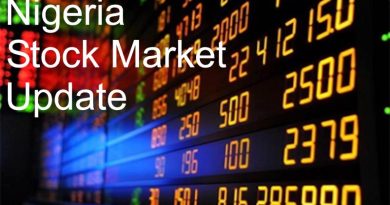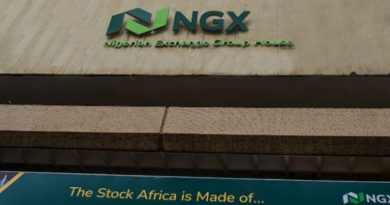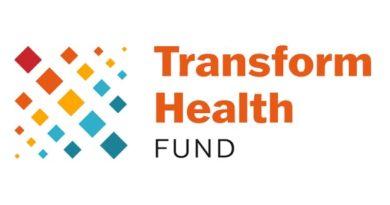Most Nigerians Are Willing To Pay For Their Health Insurance – New Poll Reveals
The United Nation’s Universal Health Coverage (UHC) Day was observed on 12th December 2019. It is a yearly event that raises awareness on the need for a strong and resilient health system and universal health coverage. UHC ensures all people, everywhere, can get the quality health services they need without facing financial hardship. It is rooted in the Sustainable Development Goal (SDG) 3 that seeks to ensure healthy lives for all at all ages. In Nigeria, the health system has been evolving over the years through various health care reforms aimed at tackling the public health challenges in the country.
For instance, the National Health Insurance Scheme (NHIS) was launched in 2005 with the focus of promoting affordable healthcare to Nigerians. However, news reports and statistics have shown that the scheme only covers less than 10 percent of Nigerians and that three-quarters of health care spending in the country was out of pocket payments made to health providers, leaving most of the vulnerable population of the country at the risk of catastrophic health spending.1

In commemoration of the Universal Health Coverage day, NOIPolls conducted a public opinion poll to assess the perception of Nigerians regarding health insurance in the country. The main crux from the poll revealed that a vast majority of Nigerians (83 percent) do not have access to any form of health insurance having to pay out of pocket to access health care services. Most Nigerians, however, (70 percent) in this category expressed their willingness to pay a small amount of money to enable them access service whenever they fall ill. This implies that there is low access to the National Health Insurance Scheme across the country and calls for intensive sensitization and mass mobilisation of the populace as 50 percent opined that they are not aware of the Health Insurance Scheme whose primary objective is to make health care accessible and affordable to all Nigerians.
There is an urgent need to amend the NHIS Act and enact laws to make the scheme more accessible and compulsory for all Nigerians as this would ensure adequate monitoring, efficiency, proper utilization of the health facilities and ultimately better health care delivery system in the country. Also, while it is critical for government to re-evaluate its current budgetary allocation to the health sector; it is also important for stakeholders to consider more sustainable ways to finance of the sector through health insurance, and to mobilise the public to increase the pool of funds available for investment into the sector.
Therefore, there is need for an urgent expansion of social health insurance across the country to guarantee financial risk protection to the population and reduce the incidence of out-of-pocket payment. The NHIS needs to support the states to establish their State health insurance schemes and contribute to funding the coverage of the vulnerable population groups namely – young children under age 5, pregnant women not covered by formal health schemes, the elderly population and the economically indigent population. These are some of the key findings from the Health Insurance Poll conducted in the week commencing 9th December, 2019.
Background
In its commitment to the adoption and achievement of the Sustainable Development Goals (SDG) particularly SDG 3 that addresses Good Health and Well-being, Nigeria launched the National Health Insurance Scheme (NHIS). Health Insurance Schemes in Nigeria was introduced to enable access to qualitative healthcare in Nigeria by all and sundry. This is in recognition of the importance of quality medical care to the general well-being of Nigerians and the reality of financial resources as a deterring factor to acquiring qualitative health.
Its objectives include providing easy access to medical services, protecting individuals and families alike from financial hardship of huge medical bills, ensuring the equitable distribution of healthcare costs among different income groups. This scheme covers both public and private hospitals in Nigeria.2 In light of this, NOIPOlls conducted a survey to gauge the awareness and perception of Nigerians on the health insurance scheme in the country.
Survey Findings The first question evaluated respondent’s self-assessment of health status and findings indicated that 87 percent reported that they are currently healthy, however, 13 percent stated otherwise.
Subsequently, when respondents were asked if they visit the hospital when ill, majority of the respondents (87 percent) interviewed stated that they visit the hospital when ill and almost all the respondents from the North-West zone (97 percent) made this assertion.
The respondents who stated that they go to hospital when ill were further asked the type of hospital they go to and the poll result revealed that slightly more than half the respondents (57 percent) visit public hospitals when ill. This shows a high utilization of public hospitals in the country. Other places respondents mentioned include private hospitals (24 percent), pharmacy (9 percent), self-medication and chemist (3 percent), prayers and traditional doctors (2 percent) respectively
Out-of-Pocket payments for healthcare services is on an increase in Nigeria, with 83 percent of respondents reporting that they pay out of pocket and another 2 percent revealed that their health services are paid for by friends and family. Coverage of insurance, either private or social insurance, remains very low at 15 percent from 9 percent in 2017. Men pay more out of pocket than women, and more women have someone else pay for their healthcare than men, and the young and elderly have someone else pay for their healthcare than the middle-aged group.
Trend analysis shows a 6 percent increase when current findings are compared with the result obtained in 2017. Although the larger proportion of Nigerians are yet to have access to any form of health insurance, it is encouraging to note a 6 percent increase in two years. Hence, more needs to be done to ensure that all Nigerians have access to health insurance.
Out of the proportion of the respondents (15 percent) who stated that they use health insurance, 81 percent use National Health Insurance scheme (NHIS) while 19 percent stated that they use the private HMO. Most of the respondents from the South East zone (95 percent) indicated that they use NHIS. With regards to age, more respondents (92 percent) aged 61 years and above stated that they use the NHIS while most of the HMO users are young Nigerians between 18 – 35 years as depicted in the figure below.
Opinion on awareness of NHIS revealed an even split as half of the respondent stated that they are familiar with the scheme while the other 50 percent claimed that they are not aware of the scheme.
Furthermore, the poll determined the willingness of Nigerians who currently pay out of pocket to pay a small amount of money monthly or yearly in order to access healthcare services when they need it. In response, 70 percent expressed their willingness to pay a small amount to get enrolled into the health insurance scheme.
Trend analysis shows an 8 percent decline in the proportion of respondents who stated that they are willing to pay to access care when ill. It dropped from 78 percent in 2017 to 70 percent in 2019
Of the proportion who wants to be enrolled, 11 percent stated that they know how to go about getting health insurance cover while majority of the respondents (89 percent) claimed that they do not know how to go about getting health insurance and this cuts across all demographics.
In conclusion, it is rather perturbing that an overwhelming majority of Nigerians do not have access to any form of health insurance as unveiled by the poll, hence they pay out of pocket to access health care services. Interestingly, it is worthy to note that most Nigerians expressed their willingness to pay a small amount of money to enable them access service whenever they fall ill. This could infer low penetration of health insurance across the country and calls for intensive sensitization and mass mobilisation of the populace to the effect that the general populace will be able to access health care as at when needed and means to pay for same won’t be a deterring factor.
There is an urgent need to amend the NHIS Act and enact laws to make the scheme compulsory for all Nigerians as this would ensure proper monitoring, efficiency, proper utilization of the health facilities and ultimately better health care delivery system in the country. It is expedient that to attract investments in the health care sector, the government has to play its role of providing an enabling environment with favourable legislations and laws and would ensure a good return on investment for the investor in whatever form desired.
Survey Methods The opinion poll was conducted in the week commencing December 9th, 2019. It involved telephone interviews of a proportionate nationwide sample of 1,000 randomly selected phone-owning Nigerians aged 18 years and above, representing the six geo-political regions and 36 states and the FCT of the country. Interviews were conducted in 5 languages – Igbo, Hausa, Yoruba, Pidgin English and English. Although we can say with 95% confidence that the results obtained were statistically precise – within a margin of error of plus or minus 4.65%; we recognize that the exclusive use of telephone polling has its limitation of excluding non-phone-owning Nigerians. Nonetheless, with the country’s tele-density put over 100 percent by the Nigerian Communications Commission (NCC), we consider our telephone polling approach appropriate. Also, given the rigorous scientific process of randomization and stratification applied, we can confidently stand by the validity of our methodology and approach. NOIPolls Limited, No. 1 for country specific polling services in West Africa. We conduct periodic opinion polls and studies on various socio-economic and political issues in Nigeria. More information is available at www.noi-polls.com.
Disclaimer This press release has been produced by NOIPolls Limited to provide information on all issues which form the subject matter of the document. Kindly note that while we are willing to share results from our polls with the general public, we only request that NOIPolls be acknowledged as author whenever and wherever our poll results are used, cited or published. NOIPolls hereby certifies that all the views expressed in this document accurately reflect its views of respondents surveyed for the poll, and background information is based on information from various sources that it believes are reliable; however, no representation is made that it is accurate or complete. Whilst reasonable care has been taken in preparing this document, no responsibility or liability is accepted for errors or fact or for any views expressed herein by NOIPolls for actions taken as a result of information provided in this report. Any ratings, forecasts, estimates, opinions or views herein constitute a judgment as at the date of this document. If the date of this document is not current, the views and content may not reflect NOIPolls’ current findings and/or thinking
NOIPolls




